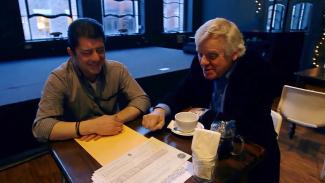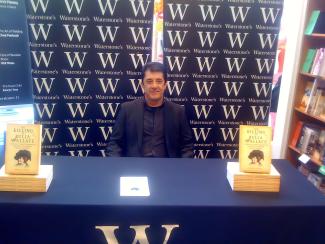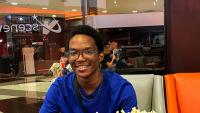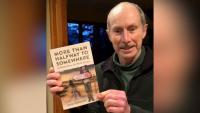From beatings to the BBC

Writer and researcher John Gannon tells us how stammering influenced his career and what led to him being filmed for two BBC programmes in a week.
My name is John and in the picture above you can see me sitting with the former TV executive Lord Michael Grade. This was taken when I was involved in a BBC documentary about the diminutive American showman Tom Thumb.
I had uncovered information concerning the tiny showman that historians never knew existed. This was a coup for the documentary makers, hence my being asked to appear in the programme and present my findings to its host, Lord Grade.
What you cannot see in the picture is the suffering and worry I went through in the weeks before my on-screen appearance. This was augmented by the fact that on the previous day I had filmed another piece for the BBC's 'The One Show' with Gyles Brandreth about my unrelated book.
Why the suffering? you may ask: I have stammered since as far back as I can remember.
Growing up out of the limelight
From an early age, many of us have had to face taunting, mocking, ridicule or even a beating for stammering. This is possibly why a lot of us prefer to stay out of the limelight as much as possible.
I spent a lot of time alone and from a very young age I was reading and writing. I could escape to anywhere I wanted to go that wasn't the verbal assault course of my usual day. As my reading progressed, I embraced non-fiction: historical mysteries, cold-case crimes and genealogy.
I spent a lot of time alone and from a very young age I was reading and writing. I could escape to anywhere I wanted to go that wasn't the verbal assault course of my usual day.
School was a nightmare! Happily, though, in primary school, once people got to know me they would, overall, be very supportive. My teachers recognised the difficulties I had when reading out in class and wouldn't ask me to take part.
That was until one of my teachers was ill and we had a supply teacher. During registration, instead of making us say 'Here' when our names were called, this particular teacher made us say 'Good morning Mrs Simpson [name changed]'. My name was called; I gasped for air as the room grew quiet. I gasped for more: the words would not come out! The teacher called me to the front of the class. When I reached the desk, she snatched a handful of 12-inch wooden rulers from a jar and ordered me to hold out the back of my hand. She then proceeded to beat me over the knuckles upon every syllable while screaming, "When I call your name, you say 'Good morning Mrs Simpson'!!!".
This experience had a dramatic effect on me — I became frightened of the possible severe consequences of stammering.
Passion
As mentioned, one of my early pastimes was genealogy. It's a wonderful personal journey of detection and discovery: you become Sherlock Holmes and Indiana Jones rolled into one. It was this passion that gave me the skill set for my future calling as a researcher.
Genealogy also gave rise to me becoming a writer.
In my early twenties I had an article published in a magazine about genealogical research I had undertaken. This encouraged my writing bent. I began writing jokes for BBC Radio 4 satirical comedy programmes including 'Week Ending' and 'The News Huddlines'.
How could I turn these golden opportunities down?! Then I remembered: I could not even talk on the phone, let alone in front of a camera!
In 2011, I had two non-fiction books published. The first book was a Beatles book, the second an historical cold-case true crime book.
Article continues below...

As my writing progressed, my reputation as a researcher grew. I had articles published in historical journals and I researched and co-wrote an academic paper. This all led to me being contacted by the BBC to assist and appear on its programmes. How could I turn these golden opportunities down?! Then I remembered: I could not even talk on the phone, let alone in front of a camera! However, the kudos it would bring, as well as the chance to promote my work, encouraged me to say YES!
Appearances & achievements
During the weeks leading up to the shoots, I feverishly wrote and re-wrote what I wanted to say in the appearances. The problem with that was that I had no idea what I was going to be asked! Those weeks were like waiting for my turn in class registration all over again. My anxiety was so high; I hardly ate and lost over half a stone in weight!
Finally the week of the shoots arrived. They were difficult but in the end, with all the years of having a stammer, having to expect the unexpected and think three sentences ahead to try to cover all bases when talking to people, I managed to pull it off.
As a published author, writer and researcher who stammers, who has just been commissioned to write a new book about an unknown piece of British history — not to mention a guy who used to be the lead singer in several bands in the 80s — I'm here to say that you can go on to achieve your dream.
This is not just my corner of the world; it is also yours. Amaze the world with your voice, in whatever way you feel comfortable putting it out there.
We demand to be heard and I am sure you all have a lot to say. Onward and upward.
Read more Your Voice articles from people who stammer.
Would you like to share your stammering experiences? See how you can Submit Something For The Site.

































